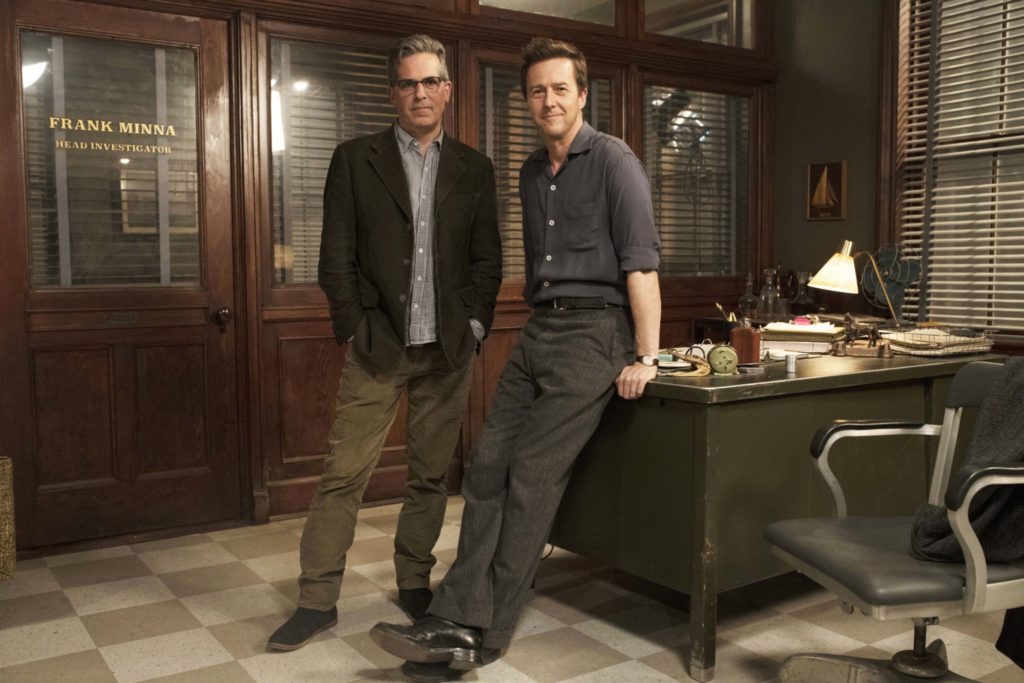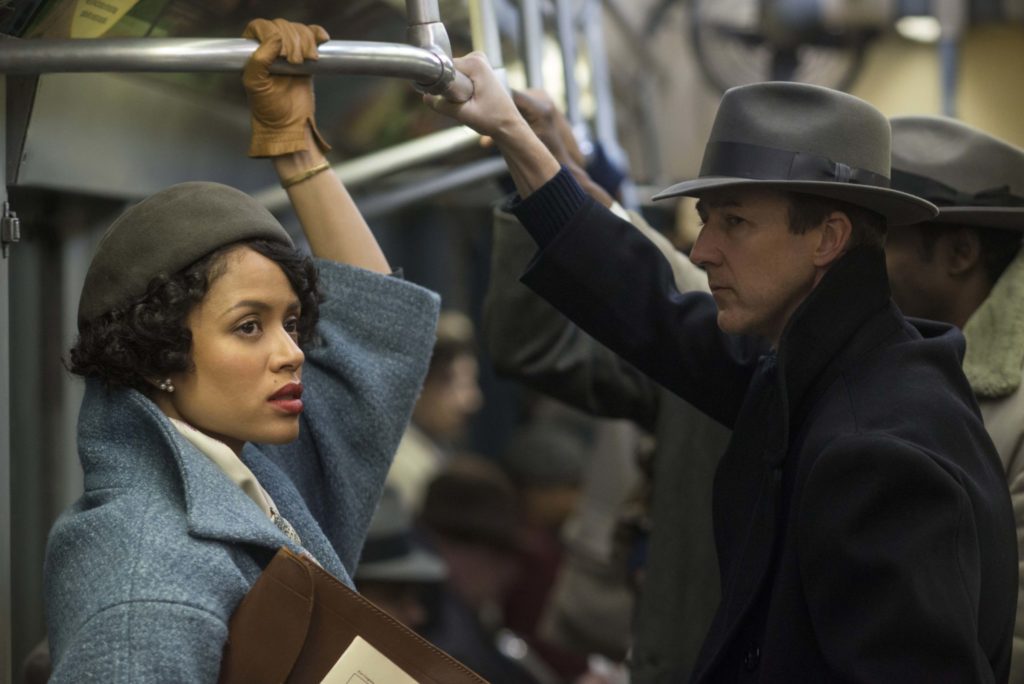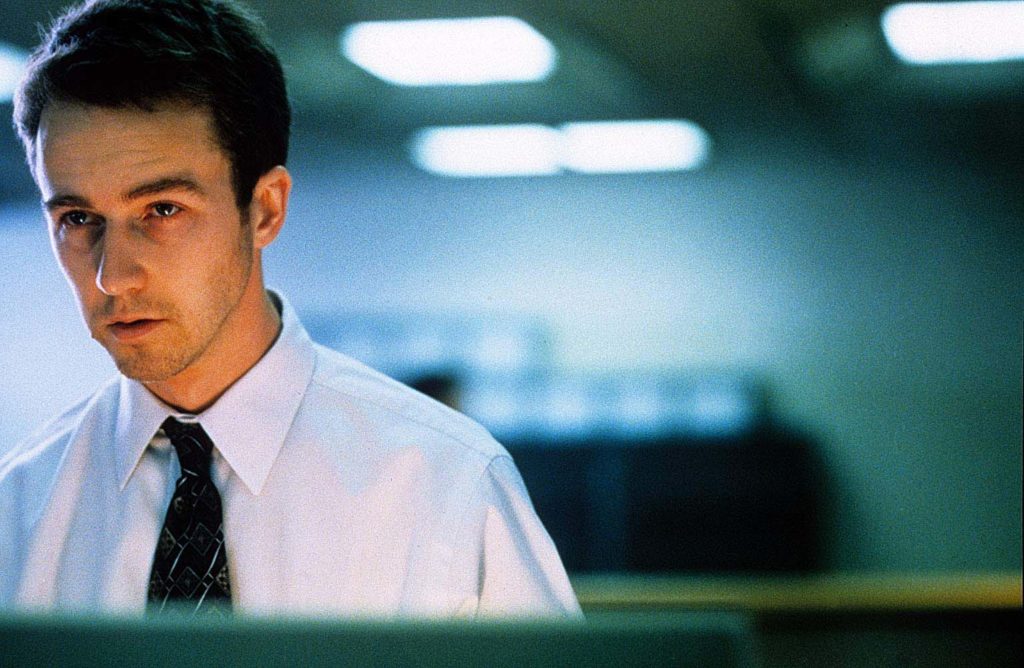- Film And TV
- 12 Dec 19

Famed for his iconic roles in Fight Club and American History X, Ed Norton discusses his latest movie, subversive noir flick Motherless Brooklyn.
"In a weird way, when I finished writing the screenplay for Motherless Brooklyn, it was when Obama had been elected for his second term, and I had this thought of, 'Maybe what I'm writing about is irrelevant now, maybe we've got beyond racial tension, and maybe sexual power dynamics aren't as interesting'!" Edward Norton says, laughing slightly. "And then, you know, Donald Trump came in and made my whole film relevant again! In a strange way, the way it worked out, this was the right moment to make this film. It's extremely meshed up in a lot of what is going on."
Norton is sitting in a London editing bay, pouring over stills of Motherless Brooklyn, his passion project that is finally hitting the big screens after years of development. Based on Jonathan Lethem's novel, Norton writes, directs and stars in the noir crime film, which follows Lionel Essrog (Norton), a lonely private detective living with Tourette's Syndrome, as he ventures to solve the murder of his mentor and only friend, Frank Minna (Bruce Willis). Armed only with a few clues and the engine of his obsessive mind, Lionel uncovers the true story of how corrupt, shady politicians shaped New York City into what it is today, through systemic racism and classism that created huge social divides in order to keep the rich, rich and the powerful, powerful.
Lethem's book came out in 1999, and Norton bought the rights to it - but he made a significant change to the setting, switching the era from the 1990s to 1957, so that he could explore the themes of corruption and gentrification in New York.
"I had this idea that I wanted to graft it with this period that I was very interested in, and fortunately Jonathan really liked that idea," says Norton. "He always said to me that the plot was an excuse for the character, and he told me, 'Nobody remembers the plot from the book - and I don't totally remember it!'"
After a few years and some bouts of writer's block, Norton finished the screenplay in 2012, but - living up to his reputation as a perfectionist - he was determined to shoot this New York story entirely in the city, and had to wait for funding.
Advertisement
"That was another dimension of it to me - I've lived in New York a long time and I've always felt that this is a component of the city's history that people don't really understand fully. I had a conviction that we could make something that was still resonant with things that are still happening today. At a certain point, you feel like a dog with a rope in your teeth - the fact that you're being blocked from doing it makes you decide either 'this is too tiring', or you get annoyed and get determined to not be defeated."

Though writing, directing and starring in a film is an enormous undertaking, Norton was always determined to play Lionel.
"The character is so compelling," he says. "There are so many paradoxes in him; he's afflicted but he's brilliant; he's lonely and an orphan, but he's tough; he's not a moralist but he does care. There are just so many dualities to the character, I think he's great. And I love the idea of a mind that is a gift and a torture at the same time."
To play a character with Tourette's Syndrome, Norton watched documentaries like Twitch And Shout and spoke to people with the condition, welcoming the challenge of portraying such a misunderstood disorder.
"Tourette's is extremely individualistic, there's no consistent expression of it," says Norton. "It's a very anarchic and in many ways, creative condition. One person I talked to abut it said that 'The beauty of this is you could invent your own version of it and it could be correct.' You see that watching films about it - every person's version of it is different. That was very liberating, but the thing I was most mindful of, and what I loved about the book, is that it creates this intimacy by being inside his head and outside. You get an intimacy with him, where you feel sympathy because you can hear his inner voice, and hear that he's a smart, kind and thoughtful person - and then you see what he's struggling with. That's the main thing I wanted to try engender, that idea of, 'I have a significant problem that I'm going to let you in on.'"
In many ways, the paradoxes within Lionel - the expressiveness of Tourette's, the need for control of his Obsessive Compulsive Disorder, his desire to solve a puzzle and understand the greater narrative shaping his world - echo Norton's role as an actor, director and writer. Did he empathise more with Lionel as the filmmaking process went on, and Norton had to harness all these different sides of himself?
Advertisement
"I've often said I'm generally much more interested in characters that I don't relate to, because I find that to be more interesting than my own life," says Norton. "But I will say, there are many dimensions of Lionel that I do relate to a lot. And I would say too that, to the degree that the film is about an authoritarian character, the film is about autocracy and the way that power works - and that felt familiar, too! Francis Ford Coppola once said something like 'The last totalitarian regime is the regime of the film director'! You kind of have to be a sociopath on some levels. You're a collaborator, but at the end of the day, sometimes people will not understand what you're doing, and you have to just say 'This is what we're doing.' So that authority aspect also comes into it, too."
In many ways, Norton has made a career out of playing characters with deep paradoxes. His most famous and celebrated roles in films like Primal Fear, Fight Club, American History X and The Incredible Hulk see his characters - sometimes literally - at war with themselves. However, in spite of the constant acclaim with which Norton's work is met, the actor hasn't been onscreen a huge amount in past years. Since celebrated performances in The Bourne Legacy and Moonrise Kingdom in 2012, and in Alejandro Inarritu's Birdman in 2014, Norton has stuck to cameo appearances and voiceover work in films like Isle Of Dogs. For the actor, it's quality over quantity, every time.
"I've never thought frequency is the mark of the greatest work," he says. "I sometimes get disappointed with people I see too much, I start to recoil. To me, there's a kind of narcissism in the assumption that people need to see you in something every year (laughs). It's not like anyone thinks Daniel Day-Lewis' performances are lesser because there are fewer of them, or Sean Penn. You feast on it, and there's a value in that. But it's not an antagonism or a lack of pleasure, I just had different priorities and distractions - but also I've been trying to get Motherless Brooklyn made. It sucks up a lot to do something like this. And I don't know if it's that I'm not good enough or whatever, but I don't think I could do a good enough job in someone else's film while working on this, it's just too distracting."
Norton denies that he personally finds it difficult to act in a film that he's directing, explaining that there's a freedom in knowing that he has final control over what of his performance makes it onscreen. However, he was aware that his multitasking could affect his fellow actors, and he was mindful of this while casting.
"I knew I couldn't have people who were needy," says Norton bluntly. "And I don't mean that in a casual sense. Sometimes, some actors need focus and that's the way they work. Almost everyone in the film is out of the New York theatre world who I've known a long time. I knew they were stone-cold trade-craft professionals. Almost the only person who I didn't have a deep history with, and knew could work with me in a way where they would be very facile, was Gugu. She didn't come from my long-time team, but she is a RADA trained actress. I can't say enough about her, she was unflappable even in the face of all the distractions I was causing."

As the film tackles how greed and corruption can destroy the fabric of society, how racism can be built into cities and countries, and how evil prevails when good people stand by and do nothing, Motherless Brooklyn is bound to start conversations about its searing relevance to the current social and political climate. This is particularly the case in the US; a fact Norton does not shy away from.
Advertisement
"This is not an exceedingly hopeful moment for anyone with a conscience or a real commitment to the actual expressed ideas of our Constitution," he states matter-of-factly. "But right now, one hopes for resilience and that what's going on right now is a painful anomaly. But I think there's a value expressed in the film that heroism is defined by people who don't sit on the fence; that there are people who don't just lay back and cynically watch it all happen. I think it's the opposite of cynicism. That's the one thing we wanted to subvert about noir - noir is often so cynical. And the detectives are not really moralists, and Lionel is not really someone who is looking past his own problems in this, but one way that the film subverts it is that the people who seem to be heroic in the beginning prove to not be, and the people who emerge as heroic are the people who don't sit on the fence."
Norton was born caring deeply about the world. His father is an environmental lawyer and conservationist, and Norton himself is a conservationist and committed activist, contributing to major developments in affordable housing and green housing. His passion for progressing social issues - particularly the issues addressed in Motherless Brooklyn - can be traced back to his grandfather.
"My grandfather was a progressive urban planner," says Norton, "and my grandfather spent all his life fighting against the forces shown in this film. I worked for him, I worked in affordable housing for a number of years."
Though his Twitter account sees Norton highlight causes close to his heart, he has largely kept his activism work relatively quiet, once saying, "Having a public forum tends to make people offer too casual a commentary." He has a similar philosophy about Motherless Brooklyn, and the potential the film has to address large and oppressive social issues. Most of the time, he believes, films focus too much on making the audience feel comfortable, and complacent.
"Within the realm of what you can do with films, glib answers in films tend to play into the Marx's line about the opiate of the masses," he remarks. "I think films can be an opiate when they create easy redemptions, or easy senses that everything is going to be okay. I tend to prefer films that stick a fork in provocative subjects and let people think. Confrontation, forcing people to have a confrontation with that which is uncomfortable. Because so much of corporate life, advertising, so much of it is telling you everything's fine. It's like The Matrix - 'Stay asleep, stay asleep, you're much easier to manage if you stay asleep.' I think that noir as a film tradition, it's a great American genre in that it says, 'Everyone in America is telling you we're this, but we're going to peel a layer back and look at the shadow of what's going on underneath. And blow apart the veneer of polite society, of Americana, that we live in a democracy.' And I like that, the confrontation of it."
Norton's concerns with the impact of corporate life and consumerism on both individual and collective fulfilment and action are not new - in fact, they were what attracted him to one of his most iconic roles as the Narrator in David Fincher's Fight Club, which celebrates its 20th anniversary this year. Does he believe that the themes of Fight Club resonate more today?
"At that time, when you think about it, it's pretty astonishing that there was no Facebook, Twitter, none of it," reflects Norton. "I'm not even sure if the old Blackberry pager had turned into the Blackberry phone. We certainly didn't have smart phones. I think at that time, what felt frighteningly numbing was a corporate culture being imposed on us. I sometimes wonder if, for kids now, if the various forms of assault and addiction and enslavement and self-definition - if you were making Fight Club today, you'd have to confront the degree to which young people are just living in these alternative spheres of a second-hand experience of life. I don't know if an 18-year-old would relate to it now, I feel like the threats have changed so fast. I almost feel as if The Matrix - that was in the same year - that feels like it's coming more and more true to me!"
Advertisement

You can read the interview with Edward Norton in the Hot Press Annual – in which we distill the highlights and low-points of the year, across 132 vital, beautifully designed pages. Starring heroes of the year Fontaines D.C. on the front we cover Music, Culture, Sport, Film, Politics, the Environment and much, much more. Buy this superb publication direct from Hot Press here.










